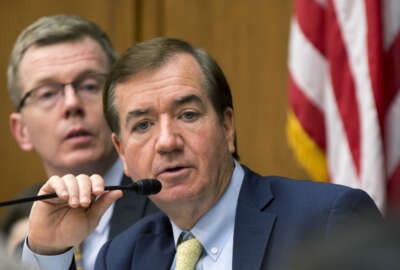
Report calls for flatter State Department with fewer bureaus
A group of foreign policy experts assembled by the Atlantic Council advocates a "de-layered" State Department, saying the current structure is "unmanageable."
A new study of the structure of the State Department requested by leaders of the House Foreign Affairs Committee calls for a simplified and “de-layered” bureaucracy to develop and carry out the nation’s foreign policy – not necessarily because it would cost less money, but because it would it would improve the department’s performance.
The report, drafted by a group of 10 foreign policy experts and State Department veterans and published by the Atlantic Council Wednesday, argued that State has amalgamated so many specialized bureaus within its organizational chart that 50 to 60 people now report directly to the secretary, a situation the authors called “unmanageable.”
The problem has been made worse, the authors said, by the proliferation of single-focus area special envoys, appointments that are usually driven by Congress.
Under the panel’s recommendations, the department’s structure would be flattened so that there are no more than three layers of management: The secretary, deputy secretary and undersecretaries; the assistant secretaries and their deputies; and office directors and country directors.
“It’s also designed to force decision-making down,” said Thomas Pickering, a former undersecretary of State who also held several ambassador posts over a 40-year diplomatic career. “If given enough time, the State Department is fond of giving every person in the department the opportunity to clear every piece of paper that passes through the department. If people are competent to clear, why aren’t they competent at the range of capacities they have to make decisions? At certain levels, the bureaus ought to decide collectively that they will make decisions at lower levels than they have before.”
The report also recommended combining bureaus that perform “like or near-like” activities into “clusters.” One such cluster would handle administration, budget, diplomatic security and back-office functions. Another, the “Politico-Military” cluster would absorb functions such as arms control, nuclear nonproliferation and counterterrorism. A third cluster would consolidate State’s economic and global issues bureaus.
The report comes as Secretary of State Rex Tillerson and the Trump Administration continue to craft their own plans to reorganize the department. In the meantime, just 24 of the department’s 147 Senate-confirmable positions have been filled, according to a database maintained by the Partnership for Public Service.
Some of the options reportedly under consideration by the administration have been to hand some of State’s current functions to the Department of Homeland Security and to merge the U.S. Agency for International Development into the State Department.
However, the authors argued against folding USAID into State, saying that “no significant problem” would be solved by such a move. Instead, they said USAID should be “revamped” and strengthened, but remain an independent agency that reports to the Secretary of State.
Among the recommendations was to give the administrator of USAID a formal seat on the National Security Council. Any changes, the panel said, should give USAID a bigger voice in U.S. civilian foreign assistance and more authority to coordinate the government’s disparate foreign aid efforts.
“From Health and Human Services and the Department of Labor to the Departments of Energy and Defense, over 25 US governmental entities have their own foreign assistance programs,” the report said. “State and USAID control approximately 70 percent of civilian foreign assistance but do not have the mandate or authority to coordinate the additional 30 percent.”
The authors also said Congress and the administration should consider revamping the federal budget process so that State and USAID funding are considered along with funding for Defense and other security spending, in what they called a “true national security budget.”
“By bringing all national security agencies and departments to the table to establish top priorities and plans to meet them, they can then recommend an appropriate split of the funding, with defined goals and well-articulated budget cost explanations,” they wrote. “Rather than the standard bureaucratic interagency and inter-budget committee squabbles, such an effort led by the NSC and OMB would be charged with producing a well-thought-out, joint proposal that is signed off and fully supported by the implementing agencies on how best to fund these interconnected efforts to achieve the desired results.”
The report also made several key recommendations to overhaul the department’s personnel system, including by redesigning the assignments process for foreign service officers and civil servants to strike a better balance between individuals’ career preferences and the department’s own needs, increasing interagency rotations, and bolstering training. It includes several recommendations to improve the Foreign Service Institute, which the authors argue should eventually become a degree-granting institution akin to the mid-career educational organizations operated by the military.
The authors said they remained neutral as to whether or not any of the changes should save money, but that they set about their work prior to the Trump Administration’s proposal to cut State and USAID funding by 31 percent in the 2018 budget.
Rep. Ed Royce (R-Calif.), Chairman of the House Foreign Affairs Committee who requested the report, said a cut of that magnitude would be unwise and noted that the House Appropriations Committee’s 2018 spending plan would reduce State’s funding by 10 percent instead.
“We should be supporting, not slashing these antiterrorism, law enforcement, humanitarian programs given the growing threats we face,” Royce said. “There is no question that improvements can be made, but we can walk and chew gum at the same time. I know we can pursue our foreign policy interests while improving efficiencies within the bureaucracy, and some of that, frankly, has to do with improving relations between the State Department and Congress.”
Copyright © 2025 Federal News Network. All rights reserved. This website is not intended for users located within the European Economic Area.
Jared Serbu is deputy editor of Federal News Network and reports on the Defense Department’s contracting, legislative, workforce and IT issues.
Follow @jserbuWFED



